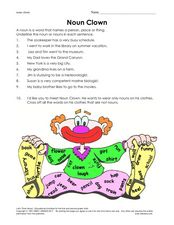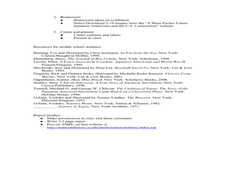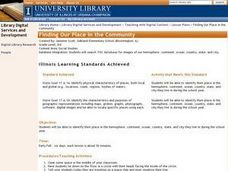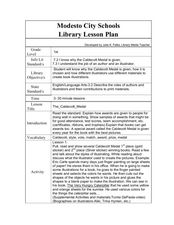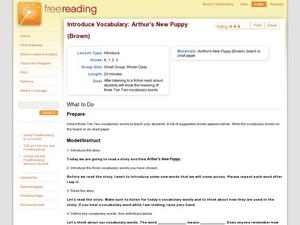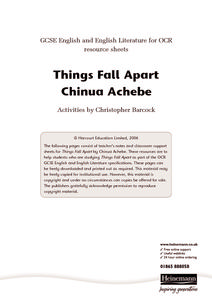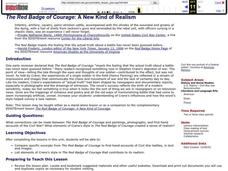Curated OER
Noun Clown
In this grammar worksheet, 2nd graders identify that a noun is a word that names a person, place, or thing. They underline the noun or nouns in each of the sentences listed on the sheet.
Curated OER
Encyclopedia Introduction
Second graders demonstrate how to use reference materials. In this library media activity, 2nd graders are introduced to the encyclopedia and are shown how to use the encyclopedia as a reference. Students use encyclopedias to complete a...
Curated OER
Dewey Decimal Rap
Students analyze four books and find the appropriate number in the Dewey Decimal System. In this Dewey Decimal System lesson, students compare their analysis with the reason they are placed in the library. Students create a rap and make...
Curated OER
Ancient Cities
Students discuss ways homes, buildings and cities are designed for a particular climate and geography. Students use a chart and conduct library and online research to explore ways the Mayans and Incas developed their land based on their...
Curated OER
Smithsonian Asian Pacific American Program
Here’s the overview for a series of lessons about the Japanese American internment introduced by the resource entitled “A Fence Away From Freedom.” Included are the link to the Smithsonian website on which the lessons are based, a list...
Curated OER
Prepare for a Field Trip
Young scholars write a journal exercise that relates to preparing for a trip. They make a visual map to generate ideas about things to see, do and learn during the field trip. They assign roles for different tasks that need to be...
Curated OER
Finding Our Place in the Community
Third graders search TDC database for images of our hemisphere, continent, ocean, country, state, and city. They identify their place in the hemisphere, continent, ocean, country, state, and city.
Curated OER
Health and Disease: from Measles to HIV/AIDS
Students consider health care and come diseases in any give community. They examine the differences between HIV and AIDS, and how they are spread. They discuss how the spread of AIDS can be reduced.
Curated OER
Art Critic for a Day!
Middle schoolers practice evaluating art by creating a research project and presentation. They use the Internet and library to discover a piece of art or artist whom they feel has an impact on the world of art. Next, they create a...
Curated OER
Dewey Decimal Game
Engage all the upper elementary classes in your school in a game to learn Dewey Decimal Classification. On 5 or 6 consecutive visits to the library, teams from each class learn how the system works, locate books in each category, and...
Curated OER
Authors and Illustrators: What do they do?
Help readers understand the roles of authors and illustrators and why they have been recognized by medals of excellence. Your class will discuss and then create illustrations for a book. When they have finished, you can hold your own...
Curated OER
Introduce Vocabulary: Arthur's New Puppy (Brown)
Learn new words as you read Marc Brown's story, Arthur's New Puppy. This is focused as a vocabulary-in-context activity (though this strategy could be used with any book and set of words). Introduce the new words you will focus on:...
Curated OER
Mathematics: A Picture's Worth a Thousand Words
Students examine school yearbooks from 1950 to the present. They count the number of male and female teachers and administrators. They compile date and extrapolate changes in job trends.
Curated OER
Tissue, Please!
Students study the proper manners to reduce the risk of spreading or catching colds and flu. They discover good cold-season manners from reading aloud Tissue, Please! They complete an art project to reinforce good cold-season manner
Odyssey of the Mind
Odyssey of the Mind Curriculum Activity: Balance the Books
There is a difference between profit and revenue, and it's up to your class to find out why. They each research the public accounting documents for their favorite company or brand. Then they use their findings to discuss the differences...
Curated OER
Cameras and Careers
Applying photography basics they learn for this project, first graders take pictures of an adult at work focusing on the tools used, the work site, and job responsibilities. After making a career book that includes photos and...
Curated OER
Things Fall Apart Chinua Achebe
Here’s a 19-page Things Fall Apart teacher resource packet from the UK that includes background information on Chinua Achebe, the culture of the Ibo people before and after colonization, and activities designed to prepare learners for...
Curated OER
Historical Interview Project
Students interview a subject about important historical events in his or her lifetime and create an iMovie of the experience. Era-related data is imported into the project from a variety of sources and presented to the rest of the class.
Curated OER
The Red Badge of Courage: A New Kind of Realism
Is it possible to tell a true war story? Tim O’Brien says that fiction is for “getting at the truth when the truth isn’t sufficient for the truth.” To get at the truth about war, class members examine primary source materials from the...
DLTK
Dolch Word List
This website provides several printable flashcards that can be used to teach sight words.
Curated OER
Historical Interview Project
Middle schoolers practice effectively interviewing a subject and then use that interview to create a movie.
Curated OER
Don't Let the Earth Down
Although recycling is definitely beneficial, reducing our waste and conserving our natural resources should really be the focus of environmentalists. Encourage the future generation to create a public service announcement about a...
Curated OER
What They Left Behind: Early Multi-National Influences in the United States
Students research the impact of European voyages of discovery and colonial influence on different aspects of American culture. They access a number of online sources and reference maps to trace the influences of England, France, Holland,...
Curated OER
Antonyms, synonyms and homophones
Shed light on what antonyms, synonyms, and homophones are. In this lesson, upper elementary schoolers create pairs using an antonym, a homophone, and/or a synonym. Then they play an antonym matching game.


